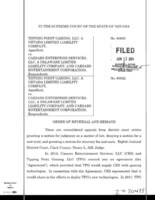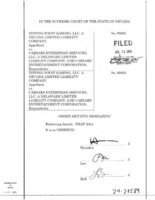INNOVATIVE GAMING TECHNOLOGY ENGINEER SAM JOHNSON PREVAILS AGAINST CAESARS ENTERTAINMENT IN NEVADA SUPREME COURT RULING
Rhea-AI Summary
The Nevada Supreme Court has denied Caesars Entertainment's request for a rehearing in a case involving Tipping Point Gaming (TPG). TPG, founded by Sam Johnson, had partnered with Caesars to bring innovative gaming technology to market. However, Caesars allegedly interfered with TPG's deals and delayed their product development, resulting in a lawsuit. Caesars sought to limit TPG's counterclaims, but the Nevada Supreme Court ruled in favor of a new trial. TPG aims to seek substantial damages for bad faith, fraud, and tortious interference.
Positive
- None.
Negative
- Caesars Entertainment faces a new trial with potential nine-figure damages claims.
- The Nevada Supreme Court's ruling reverses a favorable decision for Caesars, posing legal and financial risks.
- Caesars' alleged interference hindered TPG's product development and market entry.
News Market Reaction – CZR
On the day this news was published, CZR gained 4.13%, reflecting a moderate positive market reaction.
Data tracked by StockTitan Argus on the day of publication.
Caesars' petition for new hearing before the high court is denied in case centering on deal to bring new multimillion-dollar gaming technologies to market
TPG had patented and was working with Caesars to bring new "picture in picture" technology and other valuable, first of its kind technology to casino floors when Caesars filed suit against the gaming technology engineering company.
TPG founder Sam Johnson alleged Caesars prevented him from entering a pending contract with a third party to either invest in or purchase his company. According to court documents, first, Caesars leaned on potential TPG suitor Accel Entertainment to stand down, and Accel agreed to stand down. Then, further according to court documents, when TPG could not disclose a second suitor interested in acquiring TPG due to a nondisclosure agreement, Caesars took intentional actions to kill any deal and keep TPG's product out of the hands of a possible competitor, including filing a meritless lawsuit to chill interest.
"Their lawsuit was a stunning blow," Johnson said. "Several executives with Caesars had originally been discussing buying into our company, or even purchasing it entirely, and moving forward with the project. Caesars not only abruptly pulled the plug on our agreement, but internal Caesars emails show their executive team focused on delaying the development process instead of facilitating it as they had promised. Caesars executives knew that delay would prevent a major investment or outright purchase of TPG or would stop us from ever coming to market."
Johnson had originally viewed his relationship with Caesars as a means to bring his technology to market, as the initial plan called for the gaming giant to help guide the project through a certification process with Gaming Laboratories International (GLI). However, Johnson later discovered through Caesars internal emails among Caesars executives that they were intent on delaying or preventing his products from ever coming market, the lawsuit contends.
TPG was forced to shut down and its assets/value lost through foreclosure. According to court documents, TPG counterclaim against Caesars alleged damages claims for bad faith, fraud, and tortious interference and is also seeking consequential and punitive damages, which collectively are in the nine-figure range.
District Judge Allf granted a motion by Caesars to limit TPG's counterclaims to be considered by the jury to only those arising under a narrow technical agreement. The jury ultimately ruled against Caesars on all its claims, and at the same time determined that, although Caesars breached the agreement, there were no awardable contract damages for TPG.
In June, the Nevada Supreme Court ruled that the case would be remanded back to the District Court for a new trial after determining that Allf erred by cutting off claims before reaching the jury in the counterclaim case brought by TPG.
In the gaming industry, Johnson's wide-ranging universe of patented technology includes applications found in land-based casino gaming machines as well as leading internet, mobile and social gaming channels.
Johnson said: "If Nevada is to remain the unequivocal leader in gaming innovation and excitement on the gaming floor, developers must have access to justice no matter how big the names involved, no matter how wealthy the casino company. This Nevada Supreme Court decision and refusal to reconsider the reversal goes a long way toward making
About Sam Johnson
Sam Johnson is a serial entrepreneur with a 35-year track record of founding several cutting-edge startup companies. He has broad experience in all aspects of leading and growing high-tech businesses from the ground up with a keen eye for innovative opportunities and rapid execution. He is considered a visionary, architect and leader in the emerging "picture in picture" category of gaming industry products.
Contact: Jeff Haney
jeff@fierrocommunications.com
Office: (702) 385-7300
Cell: (702) 538-6117
![]() View original content to download multimedia:https://www.prnewswire.com/news-releases/innovative-gaming-technology-engineer-sam-johnson-prevails-against-caesars-entertainment-in-nevada-supreme-court-ruling-302215779.html
View original content to download multimedia:https://www.prnewswire.com/news-releases/innovative-gaming-technology-engineer-sam-johnson-prevails-against-caesars-entertainment-in-nevada-supreme-court-ruling-302215779.html
SOURCE Tipping Point Gaming









